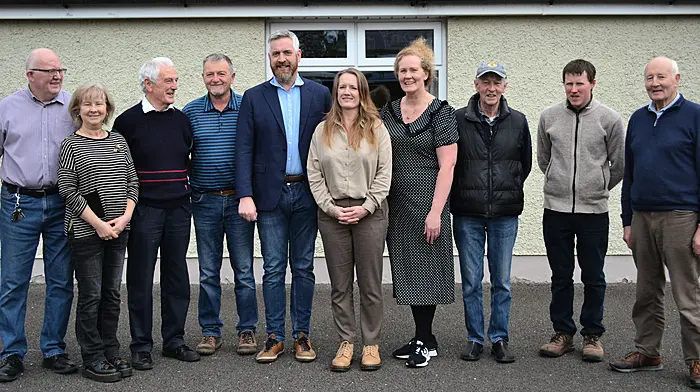A DISTRICT court judge told a West Cork farmer who allowed the carcasses of 17 dead calves to decompose on his farm that it was ‘chronic, appalling and wilful neglect’ on his part to allow this to happen.
Judge James McNulty made the comment when dealing with Ger Canty at Clonakilty District Court last week in a prosecution taken by the Department of Agriculture against him under the Animal Health and Welfare Act 2013.
At a previous court sitting in Bandon on Friday September 1st Mr Canty (66) of Farnalough, Newcestown, Bandon pleaded guilty to three charges out of a total of six, including that on April 28th 2022 he allowed two untagged bovine carcasses on his farm to which a dog may have access; that he permitted the carcasses of 15 untagged bovine carcasses to be on his farm to which a dog might have access; and that he kept 10 untagged bovines on his farm. Three other charges were taken into consideration.
Having heard the facts and read a probation report, Judge McNulty remanded him in custody to Cork Prison for four days until his appearance at Clonakilty District Court last week. At that court sitting, Dept of Agriculture senior inspector Edward Myers told the court that he attended Mr Canty’s farm on April 28th 2022 because it was showing up for being non-compliant with no birth of calves being registered in 2022 which he said was ‘abnormal’.
‘The first shed I visited I saw that there were 10 untagged calves which were older. I went to the calf shed, and even with the door closed, there was a clear smell of dead animals,’ said Mr Myers.
‘I saw 14 dead calves there and two had been partially scavenged by dogs and it appeared they has just been abandoned there.’
Mr Myers said some of the calves were decomposing and disintegrating into the bedding material. He went into another shed and saw another 10 untagged calves who were over 28 days, as well as one dead calf which was decomposing.
‘The last shed I went into I saw two more dead calves which were in extreme state of decomposition and just lying there.’
He said he reminded Mr Canty of his previous visit to the farm in 2020 where he was directed to sell his calves at an earlier stage.
‘It didn’t happen and we advised him but no action was taken. I told him to seek extra help on the farm and to fix the yard spray system, but on my more recent visit none of these were addressed.’
The court heard that the Dept of Agriculture served a welfare notice on Mr Canty on February 23rd of this year directing him not to have more than 90 cows and not to keep calves older than 43 days.
‘I was hoping they would be moved or sold, but on my most recent visit there were eight calves there.’
Mr Myers said it is his belief that Mr Canty would be better off not to have breeding stock on his farm.
‘It’s the best measure as this is a recurrent pattern on his farm.’
He said the cause of death of the calves could have been down to lack of water but added that it didn’t look as if they were properly looked after.
Judge James McNulty said all of the calves died of ‘chronic and dreadful neglect’ and it was the view of the court on September 1st that Mr Canty needed to go away and reflect.
Solicitor Conrad Murphy said his client was traumatised after spending time in Cork Prison and doesn’t want to go back.
‘He acknowledges he went through difficulties, his herd has been reduced and he will not keep calves beyond 31 days,’ said Mr Murphy.
Judge McNulty queried if Mr Canty has a future in farming but Mr Murphy said his client realises that he should have got help and will now hire a farmhand and realises the size of the herd is too much for him.
‘He knows he has to rethink his approach.’
Judge McNulty said the first duty of any farmer is to look after the land and its animals.
‘He failed to look after his animals in a manner that is shocking. I didn’t take the decision to send him to prison lightly and the probation officer said he was provided with ample opportunity to comply with animal welfare and pressure was applied,’ said Judge McNulty.
‘This is six years before the detection of these offences.’
While acknowledging mitigating factors such as having no previous convictions, and the early plea, the judge said that it’s the aggravating factors that loom largely in his mind.
‘He was well warned six years before the detection and department officials told him to reduce stock or get help. Promises were made but not kept and he had means to get help and he could have hired a labourer or farm assistance. He had income and stream of assets.’
The judge added that he imagined the accused didn’t miss a single milk cheque or grant aid but ‘animal care was neglected in an appalling manner’.
He also noted that the most recent probation report from the end of August showed that he still has calves of an age that he was directed not to keep.
‘He’s a man who isn’t learning and between that and animal cruelty that is why I sent him to prison.’
Judge McNulty said the accused needs to think again about where is going in relation to the farm before he decides on a penalty. He said he needs to engage with the Dept of Agriculture in a full and honest manner so that they can come up with a plan as to how he can continue farming.
‘It’s not accidental or thoughtless offending or someone making a mistake, this was the wilful neglect of animals who died of hunger and thirst.’
The judge adjourned the case until November 21st and directed that an updated probation report be prepared, as well as a report from Mr Myers outlining what has been agreed as to how the accused can continue to farm with some supervisions.
‘If he wants to avoid a prison sentence I suggest you provide a bank draft of €10,000 payable to Concern and can provide some step of atonement,’ said Judge McNulty, who added that Mr Canty can be expected to be under the scrutiny of the court for some time.
‘Any promises made must be kept and €10,000 to Concern would be a good start.’
The accused was released in his own bond of €100 with no cash required.







